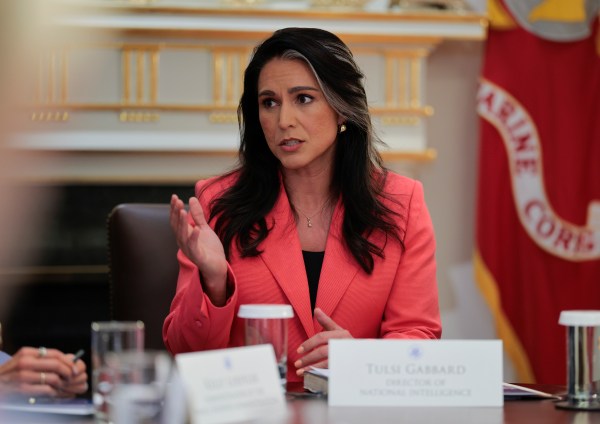At the beginning of every month, a different Dispatch staffer fields questions from members and compiles his or her answers in a mailbag a few weeks later. This month, it was Dispatch co-founder and CEO Steve Hayes’ turn. To ensure you’re able to submit questions for next month’s mailbag, click below to become a full Dispatch member.
First, thanks so much for these terrific questions; readers ended up submitting more than 130 of them. I tried to choose a few that felt representative of topics that came up repeatedly, and I failed in my efforts to keep my answers short. Despite the fact that this is already a really long mailbag, I left out way too many good questions.
I’ll try to get to more of them—and take some additional ones in real-time—on an upcoming edition of Dispatch Live. Some topics I’ll have more to say about: Fox News, my family’s time in Spain, which pro-Trump commentators believe what they’re saying and which are making it up, whether I have any regrets about writing my first book, details about The Dispatch audience, office culture at The Dispatch, Jonah’s musk, etc.
On The Dispatch
John: After 5-plus years since The Dispatch’s creation, I’d like to hear a summary of your thoughts regarding its evolution and future growth plans. I’m very grateful that you started this site for the politically homeless. Thank you.
Thanks, John. I appreciate the question. (It was the most popular one asked.)
The first thing that comes to mind when I reflect on these first five years is something you mentioned: gratitude. I’m incredibly grateful to my wife and kids for putting up with a husband/dad who was sometimes distracted or on his phone at hockey games/dance competitions; to Jonah for taking this leap with me and for working tirelessly to crank out his newsletters and podcasts; to our investors and advisers, who believed in what might have seemed like a hopelessly naive undertaking; to The Dispatch launch staff, who understood the risks and hard work involved in a startup and made the commitment anyway; to our current staff and regular contributors (now more than 30), who together are The Dispatch you know today; and, of course, to The Dispatch members, who are quite literally the reason we’re all here.
A little more on our members: On a practical level, you underwrite our reporting trips, fund our office space, and pay our salaries. But beyond that, I’m grateful that there’s a large—and growing—audience of people who want the kind of work we produce. When we met with prospective investors in the spring of 2019, they’d ask us how we could be sure we’d succeed. My response was pretty straightforward: We can’t be sure. But if there’s no audience for the kind of thoughtful, fact-based journalism we want to do, the country will have bigger things to worry about than our little startup.
About four months after we launched, The Atlantic’s McKay Coppins wrote an institutional profile of The Dispatch. It was a terrific piece—one that “got us” more than some of the others published back in those early days—and ran under the headline: “The Conservatives Trying to Ditch Fake News: The Dispatch wants to sell serious, fact-based stories to the right. But do readers want them?” It’s fair to say there was an underlying skepticism in his reporting, and at one point, he quoted Mark Hemingway, a former colleague of mine and Jonah’s (and Mollie Hemingway’s husband), suggesting we’d fail: “There’s absolutely zero market for it.”
It turns out there’s a pretty significant market for it—some 40,000 paying members and more than 400,000 “freelisters”—and we’re still growing.
We’ve got lots of exciting plans for that future growth, including new editorial products, expanded coverage areas, more events, and additional ways for members of The Dispatch to deepen their involvement with our journalists and with one another. We’re going to experiment with new revenue streams that, we hope, will allow us to reach more people and further grow our influence and audience.
Evan Johnson: Five years into this thing, what is one decision you made that you can say in retrospect was a home run (aside from hiring Sarah. That was a grand slam decision.)? And what was one decision that you would not make if you could do it over?
As far as a home run, I’d say publishing the statement we’ve come to call our “manifesto” on our first day. The original headline was “What Are We Doing?” and it sought to answer that question directly. But it also served as a mission statement of sorts and gave readers and would-be members a straightforward look at our approach to journalism. We told readers not to expect to agree with everything we published and asked that just as we test our assumptions, we hope they’ll test theirs. It’s been a useful way to let folks know what we set out to do. And if we fail to live up to the ideals we laid out there, we expect to hear from our members.
On possible do-overs, I’ll share a personal one: I probably would have shifted the balance of my responsibilities earlier to include more reporting and writing. I’ll be honest—I’ve been a little ambivalent about doing that. When I worked at The Weekly Standard, I built up a network of sources that was both broad and deep. It was more Republican/conservative than Democrat/progressive, but included policymakers, elected officials, intellectuals, strategists, and military leaders whom I’d found knowledgeable and trustworthy over the years. I was confident I could get a pretty good grip on what was happening in the news at any given moment by tapping into those sources. Today, some have retired and others have left Washington or the government out of frustration with the carnival our politics has become, often replaced by modern-day barkers simply looking for attention. Other once-credible sources have abandoned long-held policy views or principles to thrive in this new populist environment. How can I trust them? Sourcing up is always a long and arduous process, but doing that in the current moment will be even more challenging. All that said, I’m looking forward to doing more reporting and writing/podcasting in the coming months. (More on that below.)
On Journalism
Cynthia W: Dear Mr. Hayes, I think you are a very good writer. Do you plan to write for The Dispatch?
Thank you, Cynthia. It’s tempting to answer “no” so I don’t give you a reason to reconsider that view! But, yes, I’m eager to do more writing. I miss reading about and reporting on politics and national security the way I had done for so many years. I’m also eager to do some writing about travel, food, and the outdoors, too.
We recently made some changes to the business side of the operation—stay tuned for more details—in part designed to help with this shift in my responsibilities. So here’s hoping!
David Baker: The Dispatch is a refuge from the right, but still on the right. Who do you read on the left who has similarly moved away from the extreme? Bari Weiss? Matt Yglesias? Just curious.
I don’t do nearly as much reading as I’d like—of news, analysis, or books. I do read Matt Yglesias, and sometimes Jonathan Chait at New York magazine. I read a lot of what’s published in The Atlantic—and much of that comes from the left.
My favorite writer on the left, though, is Will Saletan, formerly of Slate and now at The Bulwark, where he arrived to provide ideological diversity but is now pretty squarely in the mainstream of thinking. Will is outstanding. Brilliant and intellectually honest—he always applies razor-sharp reasoning to anything he covers, and when I disagree with him, he makes me rethink my own views.
Brownmugs: As a regular contributor to NBC News, does that include MSNBC? If not, why not? Either way, do you have concerns with MSNBC as you do Fox News and do you communicate those concerns privately to your NBC hosts and publicly as you do Fox News?
My contract is with NBC News and doesn’t include the affiliated cable networks. After some 14 years of working in cable television, I was eager for the break. In many respects, cable programming has contributed to the dysfunctional politics of the current moment. It incentivizes partisanship and performative politics and discourages intellectual honesty and civil discourse. And while top-rated cable shows typically reach fewer than 3 million viewers, partisans in Washington—and party activists throughout the country—assign outsized importance to what happens on cable. (President Trump was a well-known cable addict, and President Biden is reportedly a regular viewer of Morning Joe on MSNBC.)
I can’t tell you the number of times during the 2016 election cycle when someone on a panel with me would defend Donald Trump on air and then, the moment we heard “clear” in our earpieces, mutter something close to the opposite. One example: It was within a day or two of the release of the “Access Hollywood” tape, in which Donald Trump described his delight in being allowed to, er, assault women because he’s famous. Monica Crowley was on Fox News’ Special Report panel with me that evening and offered a partial defense of Trump—or at least minimized the importance of the tape.
And then, as we stood up and took our microphones off, she said: “I cannot wait until I don’t have to defend this guy anymore.” When I told her she had no obligation to do so, she looked at me like I was crazy. (Monica went on to take a job at the Treasury Department under Trump and is today an enthusiastic defender of the former president.)
I do communicate concerns internally at NBC News, as I did at Fox, though far less frequently. That’s mostly because I almost never watch cable news anymore, so I’m less aware of the day-to-day excesses than I had been. My strong preference is to avoid public criticism of my employers when possible. I was a contributor at Fox, and I’m a contributor at NBC; I’ve never been an ombudsman, and I have never thought it was my role to police the opinions of my colleagues. But if someone is deliberately saying things that aren’t true, I find it hard to keep quiet.
I can remember discussions on The Dispatch Podcast where I criticized some of Sean Hannity’s more outrageous shilling for Trump. A few months ago, in a DisPod conversation about Joe Biden’s mental acuity, I pointed to Joe Scarborough’s claim that the president is as mentally sharp as ever as the kind of claim that’s not supported by, well, reality. On Meet the Press a few months back, I agreed with Chuck Todd’s argument that former Republican National Committee Chair Ronna McDaniel shouldn’t have been hired as an NBC News contributor, given her role in promoting stolen election conspiracies and the fake elector scheme.
The programming that finally compelled me (and Jonah) to quit Fox News, though, was in a category of its own. Tucker Carlson produced something for Fox Nation called “Patriot Purge,” a three-part faux-documentary claiming that the federal government was going after Trump supporters in the same way it’d gone after al-Qaeda. It was a cheap and dishonest attempt to rewrite the history of January 6, and the kind of thing that I believed—and continue to believe—would lead to violence. It was breathtakingly irresponsible.
I made my concerns known internally after the trailer aired on Tucker’s show. Top Fox executives were surprised to learn of the project, but even though several of them shared my concerns, they were unwilling to kill it and risk the inevitable public fight with Tucker. They were, in my view, more worried about their audience than the truth—an attitude that became clear with the release of internal texts and emails related to the Dominion Voting Systems lawsuit. There are still many good journalists at Fox News and I don’t begrudge anyone who has decided to stay. But leaving was the right decision for me.
On Living in Spain
Francesca: Why did you move to Spain for a year? I visit Spain every year to do the Camino de Santiago, but I have not seen any part of it that is not on a Camino route.
It’s sort of a weird story, actually. My wife and I have never been big TV people, but during each of her pregnancies, we fell into a show that we watched regularly. For the second pregnancy (2007), it was “House Hunters International”—a 30-minute show that follows English speakers (usually Americans, sometimes families) as they look for a place to live in a foreign country. And invariably, after each episode, we’d have a “wouldn’t-it-be-cool-to-do-that” conversation. At some point, we decided we’d rather be the kind of family that takes these adventures than the kind that talks about how lucky other people are. So we started saving.
In the spring of 2016, my wife and I took a scouting trip to Madrid to explore neighborhoods and visit schools for the kids. We found a school—the St. Thomas Aquinas American School—that seemed perfect. The classes were in English (our kids knew little-to-no Spanish when we went), but the students were overwhelmingly Spanish. We were pretty serious about it, and I’d gotten preliminary approval from Bill Kristol, my editor at The Weekly Standard, to remain employed there in a reduced role. And while we were in Madrid, visiting the famous Mercado de San Miguel, I got a text from Bret Baier, my longtime friend and colleague at Fox News, informally letting me know that my request to pause my Fox contract for a year while I was in Spain had been approved. It was early afternoon, as I recall, but we nonetheless ordered a pitcher of sangria and toasted our coming adventure. We planned to live there from July 2017 to July 2018.
Following the 2016 election, I was offered the job of editor-in-chief at The Weekly Standard. For all sorts of complicated reasons, I didn’t want it. My role as a senior writer was the best job in journalism; I didn’t like the clickbaity direction the Weekly Standard’s owner and his advisers were taking us; I worried that they’d apply pressure on TWS to become “Trumpy;” and, mostly, I’d made a promise to my family that we’d spend a year in Spain. But after lots of discussions—and repeated reassurances on the journalism and politics of the position, plus a commitment that I could keep my promise on Spain—I accepted. A few days later, in a sign of things to come, the business side leaders informed me that, without consulting me, they’d hired someone from Breitbart News to serve as our new digital editor. I should have quit on the spot. At their request, we postponed our year in Spain to July 2018 through July 2019, but I remained the full-time editor-in-chief. I spent the first six months trying to keep them from shuttering the magazine, but in December 2018, despite several individuals or groups signaling interest in buying the magazine, they shut it down, shifting our subscriptions to the other publication they owned, The Washington Examiner. It was a frustrating time, as you might imagine.
The other motivation to live in Spain was selfish. I’d studied Spanish for years before going to college, but I decided to study abroad in Germany after the Berlin Wall fell during my freshman year because I wanted to experience the historic change unfolding there. So, I took intensive German and studied at the University of Freiburg for a semester. I loved the idea of living in Spain for a year to become fluent, but that didn’t happen. I may have to return.
Jack: Since you lived in Spain for a year, que bueno es tu español?
Desafortunadamente, mi español sigue siendo bastante malo.
When we lived there, I had a go-to line that I used almost every day to make clear that my Spanish was a little rusty. What I intended to communicate was, “It’s been 30 years since I’ve studied Spanish.” (Hace treinta años que no estudio español.) But what I said instead was, “Hace treinta años que estudio español.” (It’s been 30 years that I’ve studied Spanish.)
Jane from CO: When I was very young, my family lived in Brussels for several years. My parents wanted us to travel throughout Europe while we could, which was such a wonderful and formative experience.
Did you do that with your family when you lived in Spain? If so, where did you go? Did your kids go to a school where English was spoken? (We went to the International School and learned French, starting in second grade, for me!) Did your kids have any difficulty adjusting to life back in the States?
We did do some traveling through Europe, but spent most of our time in Spain. A few days after we arrived, Spain had a once-in-a-century heat wave that coincided with a broken air conditioner in our new apartment. We had planned to spend the first few weeks in Madrid to let the kids adjust to their new home, but the prospect of no A/C wasn’t very appealing.
On our second morning in the apartment, my wife and I couldn’t stand it anymore and started looking at flights. We found super cheap flights to Prague—$50 each, as I recall—but the trick was they were for departures that afternoon. We told the kids they could take one backpack and had to be ready to head to the airport in three hours. We started in Prague and ended in southern France, making it up as we went. It was a blast. (We also happened to stay in a castle/hostel outside of Zurich, which features one of Europe’s top grill chefs. I hung out with him long after our dinner. Attending one of his weekend grilling schools is on my bucket list—or maybe I’ll just assign myself that story when I finally start writing again.)
Jodi Chambers: Regarding Spanish wines: favorite varietals, red and white, and then favorite respective vineyards?
I’m a Tempranillo guy. Big, bold reds. Ribera del Duero and Toro are my favorites; Rioja is right behind them. Among my favorites is a winery called Pago de Carraovejas. I love everything they make, and “El Anejón” is one of my all-time favorites. I love Pintia and Alion, which are very different wines produced by Spain’s most famous winery, Vega Sicilia, as well as Terreus and VS from Mauro. Here’s a list of reds to try, along with rough guesses on prices in the U.S.
- Muga Prado Enea (Rioja), $90
- Muga Selección Especial (Rioja), $45
- Torre Muga (Rioja), $95
- Macán (Rioja), $60
- Roda II Reserva (Rioja), $80
- Numanthia (Toro), $50
- Pintia (Toro), $100
- San Roman (Toro), $50
- Mauro (Castilla y Leon), $50
- Mauro VS (Castilla y Leon), $75
- Abadia Retuerta (Sardon del Duero), $25
- Aalto (Ribera del Duero), $50
- Alion (Ribera del Duero), $100
- Corimbo I (Ribera del Duero), $60
- Garmon (Ribera del Duero), $75
- Pago de Carraovejas (Ribera del Duero), $45
- Pago de Carraovejas Reserva (Ribera del Duero), $79
- Pago de Carraovejas El Anejon (Ribera del Duero), $150
- Terreus (Ribera del Duero), $135
- Emilio Moro (Ribera del Duero), $30
I like some Spanish whites, too, particularly Albariños and Rioja Blancos.
On Wisconsin
Cdombeck: Steve, As a proud Wisconsinite and Packers fan, why did you allow Declan, a rabid Bears fan and propagandist, to insert his rather embarrassing pro-Bears messages into The Morning Dispatch for so many years?
We believe in publishing a wide variety of views here at The Dispatch, including some that I find wrong—and even offensive. (We let Jamie Weinstein engage another odious Windy City product, Bill Ayers, in a recent Dispatch Podcast interview, though, unlike Declan, Jamie was challenging that Chicago propaganda, not amplifying it.) You can be sure that if Declan’s bad opinions ever include erroneous statements of fact, I will turn him over to Alex, our fact checker, for a good debunking.
Lee: Which of the New Glarus beers is your favorite? (cc: JacobSedgie)
I do love Spotted Cow, but I usually choose Moon Man or Totally Naked. Clean, crisp, smooth, and not as hoppy.
Mur1ie1960: What do you think of Jordan Love, and what is your over/under for wins for the Packers this season?
I was skeptical of trading up for Love in the first round and had little reason to doubt the pessimistic reports from Packers beat writers over the first couple of years of his career. So last year was a really exciting surprise. I love his poise, and he seems to have developed the kind of quick decision-making that’s so important to success as an NFL quarterback.
I’d put the over/under at 11 wins this year, with lots of upside after Matt LaFleur finally fired Joe Barry as defensive coordinator. I’d love to believe we’ll win the division, but it won’t be easy. I think the Detroit Lions are really good. I’ll be surprised if the Bears compete for the division (Editor’s Note: You shouldn’t be), but they did have an impressive offseason. The Vikings are also a football team in the NFC North.
On Politics
Andy Napoli: Which political party do you think will eventually absorb the “Remnant” conservatives who actually believe in limited government, Pax Americana, moral truths, character in elected leaders, and free trade? Right now neither party is much interested in any of those things. Maybe 20 percent of the GOP, some similar percentage of independents, and perhaps 5 to 10 percent of Democrats are interested in those things. How do you think this Remnant will be absorbed into one of the parties?
I’d like to be able to give you a clear, unqualified answer to this question. But I have no idea.
The key questions in the GOP: How much of what the party currently advocates on policy truly represents an ideological shift? And how much is simply driven by political expediency? You have some prominent Republicans who have remade themselves, policy-wise, as populists. I’ve been doing some reporting lately on Marco Rubio. I covered Rubio’s 2010 GOP primary campaign when he ran as a small government—even an anti-government—conservative, sounding alarms about the size and scope of the federal government, punitive regulatory schemes, debt, and Obamacare. On foreign policy, he was an unapologetic hawk and an advocate of the U.S. using its influence to shape world events.
Today, Rubio is an advocate of what he calls “common-good capitalism.” He pushes U.S. industrial policy; he rarely mentions “free trade” without emphasizing “fair trade”; he’s willing to use the power of the federal government to punish companies whose practices don’t align with his politics. He’s been more consistent on foreign policy, but recently voted against additional funding for Ukraine despite his regular warnings about Russian adventurism. Is Rubio doing this because his views—in some cases, his core principles—have changed? He says he saw things as a presidential candidate that he hadn’t seen as a senator from Florida and revised his views accordingly. I’m skeptical. If he were chosen as Trump’s running mate and took over as president, I suspect we’d see him govern as a weird hybrid of Trumpy populism and old-school Rubio conservatism.
To return to your question, I’d bet that a GOP run by Marco Rubio—even industrial-policy Marco—would be a pretty hospitable place for Remnant conservatives. And it’s still the case that many Republican electeds are less ideologically Trumpy in private than they think they need to be in public.
But if the GOP has shifted ideologically, whatever the reason, I don’t think the same is true of Democrats—at least to the same extent. Joe Biden is a big-spending progressive with a meandering, leading-from-behind foreign policy. And his party is captive to the identity-politics left that would make absorbing Remnant types exceedingly difficult.
On Music
Tishdmurray: Steve, who are your favorites on Apple Music?
My playlists are a bit all over the place. I like indie folk, alternative country, and early hip hop. Among my most-listened-to artists over the last two years are: Gregory Alan Isakov, Caamp, De La Soul, Noah Kahan, Tyler Childers, Penny & Sparrow, the Wailin’ Jennys, and A Tribe Called Quest.
Among my all-time favorites is a guitarist and vocalist named Kelly Joe Phelps. He was an extraordinarily talented musician who developed a nerve condition that kept him from playing. He recovered, but died a short time later. Every journalist has what my friend Matt Labash calls “soul pieces”—the articles you were born to write. I’m hoping to find the time one day to write about Phelps: his music, his life, and his passing.
My Favorite Question
Denise Cote: First off, I have to tell you back in the day I subscribed to both, but preferred The Weekly Standard over National Review (sorry, Jonah). I’ll be forever grateful you two founded The Dispatch and I’m proud to be a founding member.
Now to the really important stuff. Let’s say you have a big family event coming up. What are you grilling? What sides accompany the main course? What are we drinking, and what’s for dessert?
I’ve loved all these questions, but this one might be my favorite. There’s very little I’d rather do than get together with family and very little I like to do more than prepare food for such an occasion. I grilled and smoked meats for about eight hours on Independence Day earlier this week, and loved every minute of it.
For this big meal, here’s the menu:
Welcome Nibbles
We’d start with a big cheese platter and charcuterie board, a mix of traditional Wisconsin and Spanish meats and cheeses: a sharp cheddar, a smoked gouda, a habanero jack, port wine cheese spread from Renard’s in Door County, Wisconsin; manchego and herbed goat cheese from Spain. Similar sourcing on the meats: a summer sausage and some sliced jalapeño cheddar beef sticks from Nueske’s, along with some chorizo picante and traditional fuet from Spain.
Starter
Smoked wings on the Traeger, with four different sauces: jalapeño buffalo, hot honey sriracha, spicy teriyaki, and Greek (Cavender’s Greek Seasoning and olive oil).
Sides
A big leafy salad with Boston lettuce, diced green onions, fresh jalapeños, hearts of palm, and a jalapeño ranch dressing.
Also: Tater tots baked on mesh pizza flats to ensure maximum crispiness, with Cavender’s generously salted on top.
Main
Cajun/black pepper-crusted beef tenderloin, served medium rare or medium rare-plus.
Drinks
Miller High Life, Pabst, and Dogfish Head SeaQuench Ale. Vernors Ginger Ale and Coca-Cola. Groth Sauvignon Blanc (CA) and Pazo de Barrantes Albarino (Spain). Alión and Pintia (Spain).
Dessert
Smoked Door County cherry pie with vanilla frozen custard.







Please note that we at The Dispatch hold ourselves, our work, and our commenters to a higher standard than other places on the internet. We welcome comments that foster genuine debate or discussion—including comments critical of us or our work—but responses that include ad hominem attacks on fellow Dispatch members or are intended to stoke fear and anger may be moderated.
With your membership, you only have the ability to comment on The Morning Dispatch articles. Consider upgrading to join the conversation everywhere.